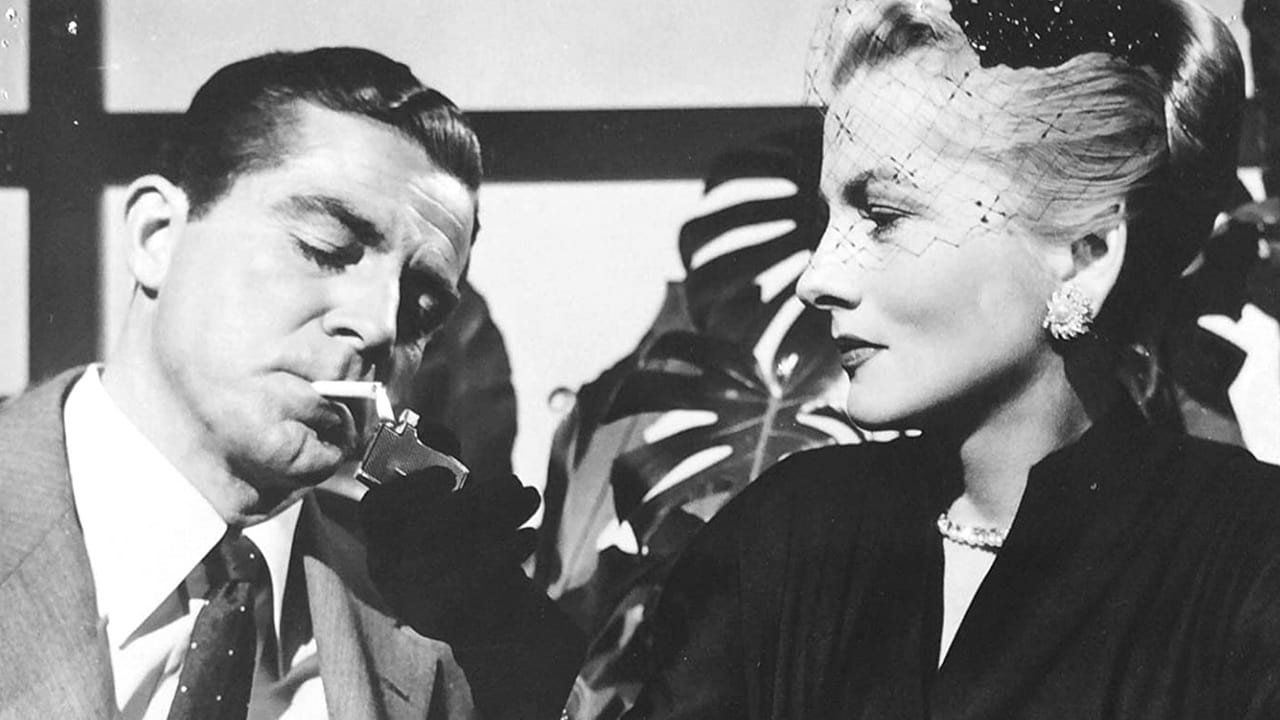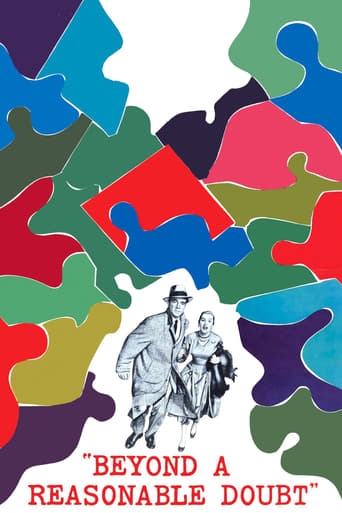Stevecorp
Don't listen to the negative reviews
HottWwjdIam
There is just so much movie here. For some it may be too much. But in the same secretly sarcastic way most telemarketers say the phrase, the title of this one is particularly apt.
Iseerphia
All that we are seeing on the screen is happening with real people, real action sequences in the background, forcing the eye to watch as if we were there.
Usamah Harvey
The film's masterful storytelling did its job. The message was clear. No need to overdo.
Armand
a film- noir who brooks in inspired manner the ordinaries rules of genre.the secret - precision of atmosphere build, the use of details, the acting who must be only correct and the final. result - a kind of puzzle who presents a new image , far to the expectation against the clue from title. that is the difficult fact, because Lang propose a different way for trip. and the viewer who desires see same story in different nuances, ignores the admirable craft who defines the master's signature. extraordinary in this case is the equilibrium. not the mistakes, at first sign, from script who does unrealistic few scenes, not the performance of actors who could seems be cold. but the work of director to give elegance to a story who impress for its refined elegance and subtle solutions. a good film ? maybe. more important, a high Fritz Lang.
Spikeopath
Beyond a Reasonable Doubt is directed by Fritz Lang and written by Douglas Morrow. It stars Dana Andrews, Joan Fontaine, Sidney Blackner, Arthur Franz and Philip Bourneuf. Music is by Herschel Burke Gilbert and cinematography by William Snyder. Plot has Andrews as a writer who hatches a plan with his future father-in-law to expose the weakness in using circumstantial evidence to send suspects to the electric chair. The ruse is to plant "evidence" that will incriminate Andrews in a topical murder and see him sentenced to death. Then the two men will reveal their own photographic evidence to prove the folly of law and the death penalty. But it's a dangerous game to play, and fate and hidden secrets may have the ultimate say on the outcome?It was Fritz Lang's last American movie, after wowing cinema fans with such excellent pictures like M, The Big Heat, Scarlet Street and While the City Sleeps, it's safe to say that Beyond A Reasonable Doubt is not the great swansong many had reason to expect. There's nothing particularly impressive about the camera work or photography, while the sets look distinctly under nourished. But veering away from our yearnings for technical smarts, film finds Lang determined to prove a bitter based point whilst enjoying dangling his protagonist above a fascinating pit of ifs and maybes.The fascination comes from the court case that underpins the movie, as we observe the law unfurling its might, privy to the dangerous ruse perpetrated by Andrews' daring Guinea Pig. It feels cold in narrative, and most certainly that is intentional because the last fifteen minutes of film pulls the rug from under everyone and finally reveals its hand. It's then, as the end card appears, that the film comes full circle and delivers on the promise of a game of human chess. Where the winner is not innocence or guilt, but something that drives many a film noir picture, that which concerns the vagaries of fate.The main cast players rightly play it sedately, with Andrews calm and understated, and Fontaine regal like and serene in dialogue delivery. Best turns come from the support slots, with Blackner most interesting as the newspaper publisher-come potential father-in-law-come the man who originated the idea for the "hoax", and Barbara Nichols who charms and entertains as the air head dancer who becomes a critical pawn in this particularly tricksy game of deceit and suspicion. It's never overtly film noir until the last quarter, and really it's a court room/legal drama sprinkled with some less than sparkly dust. Yet in spite of the undeniable contrivances that reside within the plot, this is still prime Lang for the way it observes the law and the human condition that said law brings out of the skin. 7.5/10
Michael_Elliott
Beyond a Reasonable Doubt (1956) ** 1/2 (out of 4) Frustrating film about a journalist (Dana Andrews) who decides to show that the current court system has a lot of holes in it by framing himself for the murder of a dancer. The plan is to be convicted by a jury and sent to death row where he, along with the help of his girlfriend's father (Sidney Blackmer), will admit that they were just trying to bring down the system. Lang's final American film has a terrific idea but none of it really comes together and when the end credits come up you can't help but be very, very disappointed. All of the elements for a great film are right here but I guess Lang was in a hurry to get back home because his direction is way too laid back and he really never brings any life or energy to the film. The biggest problem is the first hour where the investigation and trial take place because we know what's going to happen and we know to expect a twist in the story. When this twist does happen it comes as no surprise because it's the exact same twist anyone would be expecting to happen. When this twist finally appears it actually kick starts the movie a bit but by this time it's way too late. The final twenty-minutes of the film finally gets some drama going and we get yet another twist that I certainly didn't see coming. Lang appears to have snapped out of his sleep-walking and it's a shame more detail and thought wasn't given to the first portion. The performances are a mixed bag as the usually reliable Andrews pretty much goes through the motions here. Not once did I see any real emotion coming from him as he appears bored and just walking through the bit. Joan Fonataine turns in a fine performance as the girlfriend and Blackmer is good as her father. Philip Bourneuf is also good in the role of the prosecutor. There are many good things in this film but sadly there are some bad ones that keep this movie from being a masterpiece. It's hard to believe that the first part of this movie could be so flat but perhaps the filmmakers should have had the first hour trimmed down to twenty-minutes and then make the final moments stretched out and centered the majority of the movie on them. This is still a noir worth seeing but I really wish I could have called this a masterpiece.
zardoz-13
"Beyond A Reasonable Doubt" is the last film that "M" director Fritz Lang made in Hollywood, and the theme of this intriguing but far-fetched law and order thriller concerns the morality of capital punishment. Capital punishment, crime, and murder obsessed Lang throughout his lengthy career, and this RKO release provided Lang with another opportunity to deal with an innocent man who through a fluke in the justice system may die for a crime that he didn't commit.Tom Garrett (Dana Andrews of "The Ox-Bow Incident") is a former newspaper journalist turned novelist who agrees to test the strength of the justice system when his former boss, newspaper publisher Austin Spencer (Sidney Blackmer of "Duel in the Sun"), thinks that the local district attorney is too good at his trade. Spencer loathes the idea that an ambitious District Attorney Roy Thompson (Philip Bourneuf of "The Molly Maguires") will exploit his ability to send men to the electric chair as a means to becoming the next governor. When a burlesque queen is murdered, Tom and Austin proceed with their plan to implicate Tom for the homicide.Meanwhile, Austin's daughter Susan (Joan Fontaine of "Suspicion") does not understand this secret scheme that her father and Tom are concocting until she sees a picture of her fiancée in the newspaper with another woman Dolly Moore (Barbara Nichols), who stripped at the same club with the victim. Anyway, Tom buys a grey top-coat which a witness, who could not discern the facial features of the man, said he was wearing. Tom takes a lighter that Susan gave him and throws it in a ravine near where the girl died. Eventually, Thompson takes Tom into custody and charges him with the death of the stripper. The morning of the sentencing, Austin puts all the pictures in an envelop and backs out of his garage. No sooner has he backed out than a truck collides with him, knocks his car over, and a fire erupts. Austin dies in the car and the evidence goes up in smoke. Tom reacts with shock at the death of Austin. He goes into court and explains what happened, but the jury finds him guilty and he is sentenced to die in the electric chair.The two sizzling surprises that cap this nifty 80-minute melodrama will leave you reeling. The chief difference between this version and the new Michael Douglas version is that Lang did not have the elaborate technology the director Peter Hyams takes advantage of in his remake. Furthermore, the protagonists in the Lang version were targeting the death penalty and the ease with which Thompson won convictions on circumstantial evidence. In the Hyams version, the district attorney is crooked from the get-go. Unfortunately, this threadbare, black & white production will strike contemporary attention-deficit audiences that crave explosive action-fests as boring.

